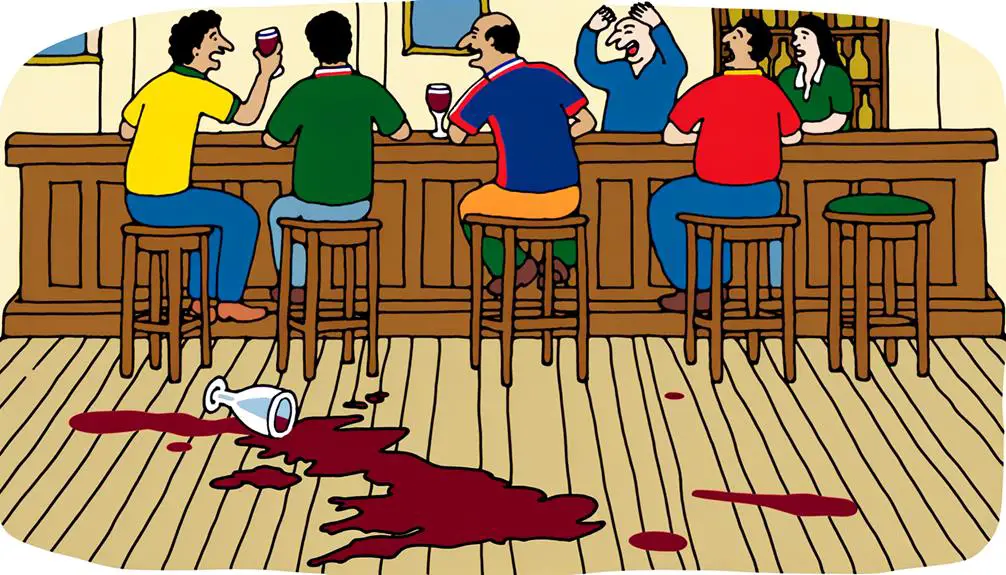In British slang, 'claret' has evolved far beyond its origins as a term for Bordeaux wine. It's a vivid descriptor for blood, showcasing the adaptability of language. This transformation, rooted in boxing rings, illustrates cultural and linguistic evolution. It's not just about sports commentary or casual chats; it's a reflection of history, societal shifts, and the dynamic nature of communication. Claret ties together the rich tapestry of British language, embodying both sophistication and the raw, visceral intensity of competition. Unpacking its layers reveals much about cultural identity and the enduring impact of words in shaping our understanding of the world.
Key Takeaways
- In British slang, 'claret' metaphorically refers to blood, particularly in the context of boxing or physical confrontations.
- The term's origins trace back to the deep red color of claret wine, drawing a vivid comparison to blood.
- It's commonly used in sports commentary and colloquial speech to describe scenes of bloodshed or injury.
- The transition from a wine reference to a slang term for blood showcases the fluidity and creativity in language evolution.
- Claret in slang reflects the cultural and linguistic interplay between Britain and France, stemming from their historical wine trade.
The Original Meaning of Claret
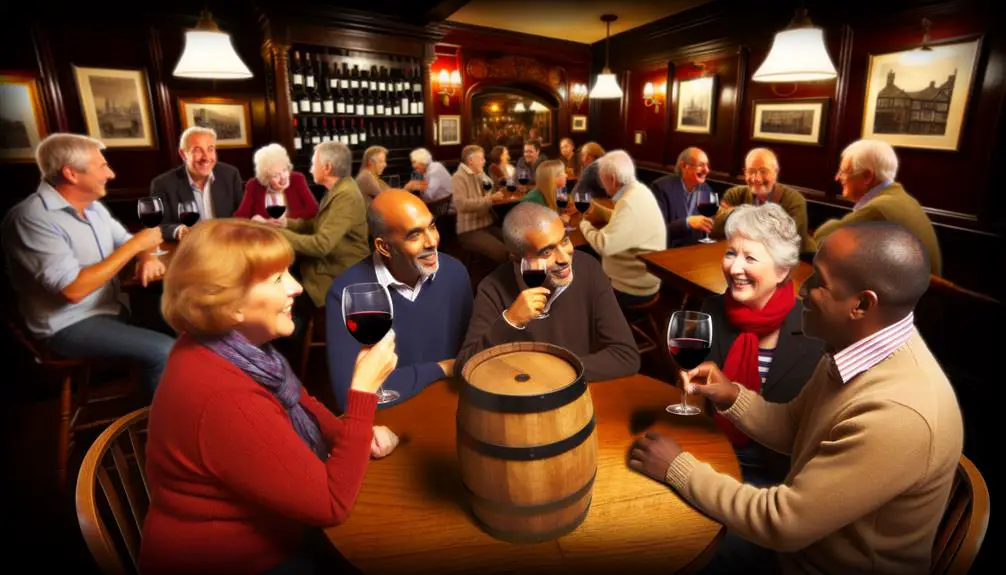
Originally, 'claret' referred to a specific type of dry, red Bordeaux wine, beloved for its rich color and depth of flavor, indicating not just a beverage preference but also a marker of social sophistication and taste. This term encapsulates a vast range of wine characteristics, each telling a story of the terroir from the Bordeaux region. You're delving into a world where the soil, climate, and grape varieties interplay meticulously to produce wines that are not only complex but also highly esteemed.
The Bordeaux region, renowned for its prestigious vineyards, contributes greatly to the defining attributes of claret. The wine's characteristics—ranging from the tannin levels to the aromatic profile—are influenced heavily by the varietals used, primarily Merlot and Cabernet Sauvignon. These grapes, in their unique combination, yield a wine that's both robust and delicate, with an ability to age gracefully.
Understanding claret in this perspective requires an appreciation for the nuances of wine production in the Bordeaux region. It's about recognizing the craftsmanship behind each bottle, a representation of the region's centuries-old wine-making tradition. As you explore claret, you're not just savoring a beverage; you're immersing yourself in a rich cultural heritage, distinguished by its wine characteristics and the exceptional expertise of the Bordeaux region.
Transition Into Slang
While delving into the rich heritage and intricate production of Bordeaux's claret offers a deep appreciation for its complexity, it's fascinating to see how the term has evolved beyond its original wine-related connotations in British slang. This evolution is a proof of the fluidity of language adaptation, showcasing how cultural shifts and linguistic creativity forge new meanings from traditional terms. Claret, once solely a reference to a specific type of French wine, now carries additional significance within the tapestry of British slang, illustrating the dynamic nature of language as it adapts to changing societal contexts.
The journey from a beverage designation to a slang term highlights the phenomenon of slang diversity. Slang, by its very nature, serves as a mirror reflecting social attitudes, humor, and the collective experiences of a community. In this way, the adaptation of claret into slang is not merely a linguistic curiosity but a cultural evolution. It underscores how words can transcend their original definitions, gaining layers of meaning that resonate with a broad spectrum of individuals. This shift into slang is emblematic of the vibrant interplay between language, culture, and identity, showcasing how expressions evolve and adapt over time to acquire new dimensions within the lexicon of everyday speech.
Claret in British Vernacular
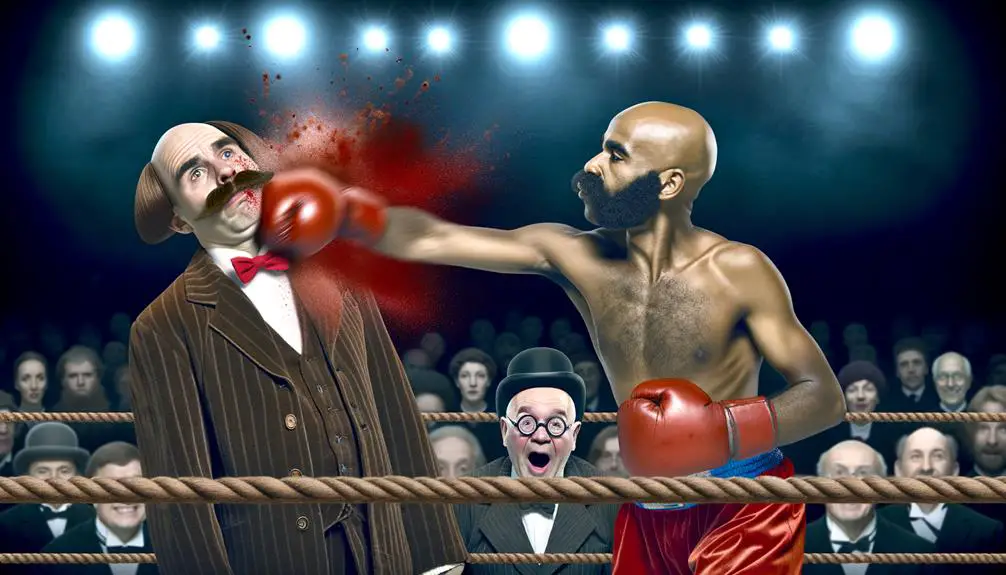
You'll find that the term 'claret' has roots deeply embedded in British history, initially signifying a type of red wine before its intriguing evolution in slang. Its modern usage and context reveal a dynamic adaptation, especially notable in informal settings and sports commentary. Understanding how 'claret' shifted from a beverage to a vivid descriptor in the British lexicon offers insight into the fluid nature of language.
Origin of "Claret" Term
In the tapestry of British vernacular, the term 'claret' intriguingly finds its roots in the boxing rings of yesteryear, serving as a metaphor for blood. This linguistic evolution wasn't accidental but rather a reflection of the deep-seated French influence on the English language. The term itself originates from the French word for a type of red wine, highlighting the extensive wine trade between England and France. This trade not only enriched the culinary landscape of Britain but also its linguistic expressions, embedding terms like 'claret' into everyday language with new, metaphorical meanings. The shift from a beverage to a symbol of spilt blood in the boxing context underscores a fascinating journey of cultural and linguistic interplay, showcasing how terms can evolve far beyond their original meanings.
Modern Usage and Context
Today's vernacular across Britain sees 'claret' not just as a validation of history but as a vivid descriptor within various social and cultural contexts, particularly in sports commentary and colloquial conversations. Its usage transcends the mere mention of a wine category, seeping into discussions that reflect broader societal trends, including shifting wine preferences and the nuances of regional dialects. You'll find 'claret' weaving its way into dialogues that range from the casual banter at local pubs to more structured debates on the cultural significance of wine in British society. This linguistic evolution showcases how 'claret' serves not only as a validation to the enduring legacy of wine in British culture but also as a flexible element in the modern lexicon, adapting to contemporary conversations while retaining its historical essence.
Claret in Sports Commentary
Exploring further, it's evident that 'claret' also finds a unique place in sports commentary, where its meaning extends beyond its traditional association with wine. In the world of British sports, particularly in boxing and football, 'claret' evokes powerful bloodshed imagery, enriching the narrative with a visceral intensity. Commentary techniques leveraging this term accomplish several things:
- Highlight the physicality of the sport, emphasizing the sacrifices and the toll on the athletes.
- Engage the audience on a deeper emotional level, making the action more relatable and dramatic.
- Enhance the storytelling aspect of sports, turning a match or bout into a vivid, memorable saga.
This use of 'claret' in sports commentary illustrates the dynamic adaptability of language, where even a word associated with elegance can be repurposed to convey the raw, unfiltered essence of competitive spirit.
Historical Context
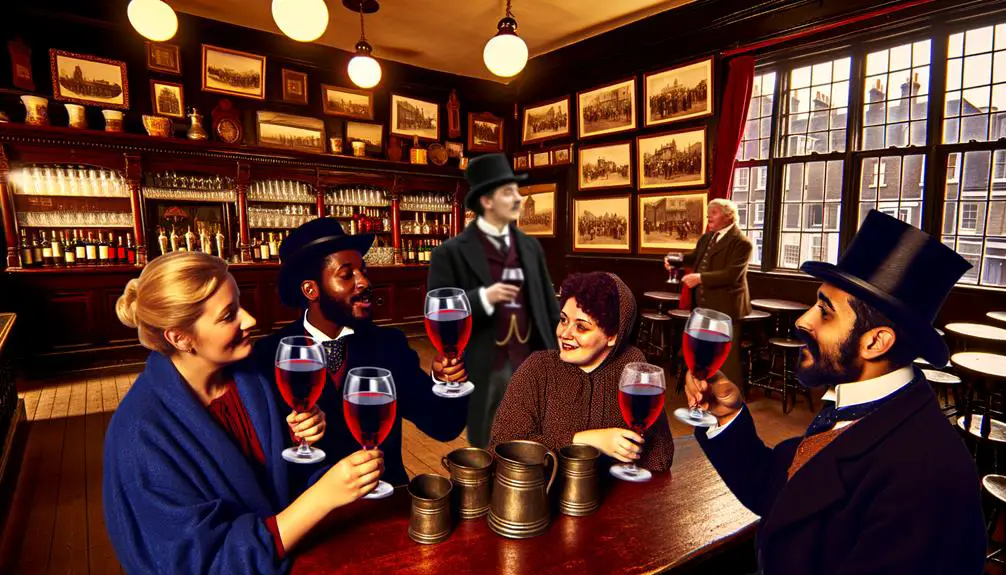
Delving into the historical background, it is crucial to comprehend how 'claret' shifted from a term denoting a specific type of wine to becoming ingrained in British slang. Originally, claret referred to a light red wine from the Bordeaux region of France, celebrated for its quality and depth. The connection between claret and British culture can be traced back to the medieval era, a period marked by robust wine production and burgeoning trade routes.
During this time, England's appetite for Bordeaux wines grew immensely, facilitated by the Plantagenet rule over Aquitaine, which lasted from 1152 to 1453. This political connection significantly boosted trade between England and the Bordeaux region, making claret widely available and highly popular among the English nobility and middle classes. The wine's deep red color and its association with wealth and status perhaps foreshadowed its eventual slang usage.
As trade routes expanded and the dynamics of cultural exchange evolved, the term 'claret' began to take on broader connotations within the British lexicon. The historical ties to medieval trade and the cultural import of wine production laid the groundwork for claret's enduring presence in British slang, underpinning its shift from a mere alcoholic beverage to a symbol rich in cultural and historical significance.
Usage in Modern Times
In modern times, the term 'claret' has evolved beyond its origins, now serving as a vivid metaphor in British slang, particularly within the context of boxing and football. This transformation highlights the dynamic nature of language, especially within the domains of sports and regional dialects. The use of 'claret' to describe the spilling of blood during a match is not only a demonstration of the creativity embedded in British slang but also reflects the cultural interplay between traditional elements and contemporary expressions.
Here are three ways this evolution can evoke emotion:
- Nostalgia: For some, the term conjures images of historical boxing matches, reminding them of a time when language and sport intertwined more visibly.
- Pride: In regions steeped in football culture, the adaptation of 'claret' can evoke a sense of belonging and identity, particularly among fans and local communities.
- Curiosity: For those unfamiliar with the deeper connotations of British slang or the nuances of wine preferences, the term can spark interest in exploring the rich tapestry of regional dialects and cultural expressions.
Understanding the modern usage of 'claret' offers insight into how language evolves, blending elements like wine preferences and regional dialects to create expressions that are both vivid and deeply rooted in cultural identity.
Cultural Significance
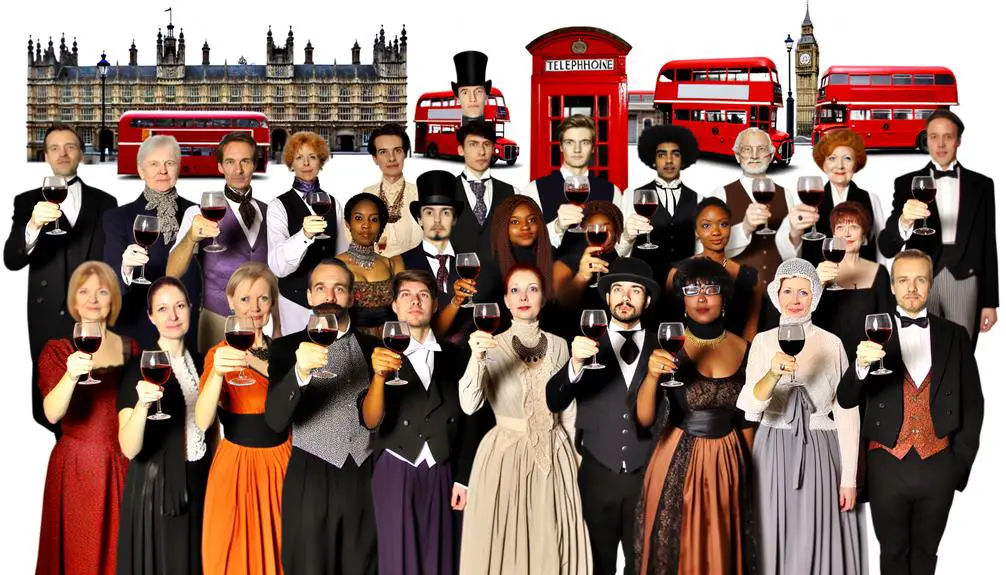
You'll find that claret's significance in British slang isn't just a matter of language evolution; it's deeply rooted in history, reflecting social hierarchies and class distinctions. Its historical origins paint a picture of societal norms and values, while shifts in modern usage highlight changing attitudes towards class and culture. This journey from a term reserved for the elite to its widespread adoption in various contexts underscores the dynamic nature of language as a mirror to social change.
Historical Origins
Understanding the historical origins of the term 'claret' in British slang reveals its deep cultural significance, rooted in social and economic contexts. This significance is intricately linked to:
- French Influence: The term itself is a nod to the deep historical ties between Britain and France, particularly through the wine trade. Claret, originally referring to a type of French wine, symbolizes the cultural exchange and influence that has shaped British tastes and language.
- Wine Trade: The burgeoning wine trade between the two countries not only enriched the British vocabulary but also reflected the evolving social practices surrounding wine consumption.
- Cultural Exchange: This exchange facilitated a rich tapestry of cultural interactions, embedding claret into the lexicon as a symbol of quality, taste, and sophistication, devoid of the class connotations it would later acquire.
Social Class Indicator
As we explore the role of claret in British society, it's evident that this term transcended its original meaning to become a nuanced indicator of social class, reflecting both one's status and cultural sophistication. The use of "claret" isn't merely about a preference for a type of wine; it's deeply intertwined with class dynamics and economic implications. The table below illustrates how claret functions as a social class indicator:
| Aspect | Implication |
|---|---|
| Cultural Knowledge | High sophistication |
| Economic Status | Ability to afford luxury |
| Social Gatherings | Exclusive events |
| Wine Choice | Preference for quality |
| Language Use | Indicator of education |
This linguistic preference signals more than a taste in beverages; it's a marker of one's place within the intricate British social fabric.
Modern Usage Shifts
In recent years, the term 'claret' has seen a significant shift in its cultural significance, reflecting broader changes within British society. This evolution is not merely linguistic; it's emblematic of dynamic cultural identities and the fluid nature of language itself. Consider how these shifts evoke sentiment:
- The deep, rich hue of claret, traditionally associated with nobility and sophistication, now permeates diverse aspects of British culture, democratizing its appeal.
- Dialect variations have introduced nuances in meaning, capturing the essence of regional identities and fostering a sense of belonging.
- Color associations with claret have expanded beyond the physical, symbolizing passion, essentiality, and a zest for life, resonating deeply with the contemporary British spirit.
This linguistic journey underscores the interconnectedness of language, culture, and identity, highlighting the vibrant tapestry of modern Britain.
Comparisons to Other Slang
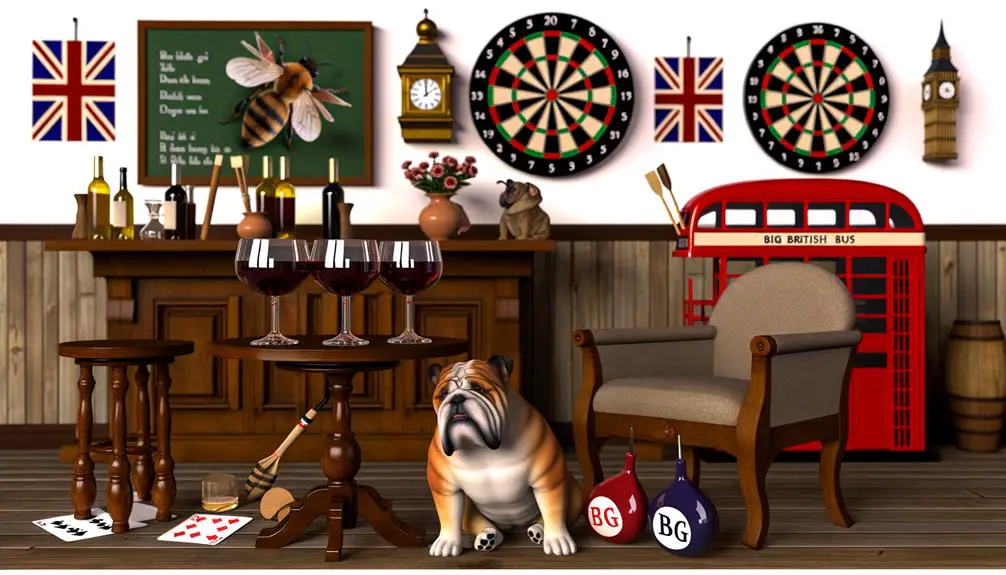
You'll find that 'claret' stands out among British slang, particularly when juxtaposed with other colloquial terms related to beverages. Its uniqueness lies not just in its application but in the socio-cultural layers it conveys. Unlike other slang, which might be rooted in more contemporary or localized contexts, 'claret' taps into a rich vein of wine terminology and regional dialects, offering a glimpse into traditions and customs that have shaped language across the UK.
| Term | Origin | Usage |
|---|---|---|
| Claret | Wine terminology, Bordeaux | Blood, in violent contexts |
| Brew | General, UK | Tea or general beverage |
| Cuppa | Colloquial, UK | Specifically refers to tea |
This comparison underscores not only the diversity of British slang but also its ability to encode specific cultural references and social practices. While 'brew' and 'cuppa' serve as warm, inclusive invitations to share a moment of relaxation or companionship, 'claret' evokes a more niche, perhaps even archaic, imagery that is distinctly tethered to the historical and social intricacies of the British Isles. This analysis reveals how deeply embedded these terms are within the fabric of British culture, each carrying its own weight and history.
Impact on Popular Media
Exploring how 'claret' has permeated popular media reveals its significant influence on shaping public perceptions and dialogue. You've seen it subtly woven into dialogues in your favorite British films and TV shows, and perhaps you've even heard it dropped during interviews by celebrities, giving it an air of exclusivity. This slang, deeply rooted in British culture, illustrates the power of language in media portrayals, influencing not just how individuals communicate but how we comprehend each other.
- Media Portrayals: The use of 'claret' in films and series often paints a picture of British grit and resilience, evoking emotions from amusement to awe. It's not just about the word; it's the context that stirs feelings of connection or curiosity among audiences worldwide.
- Celebrity Endorsements: When public figures use 'claret' casually in conversations, it's not merely about preference; it's a nod to cultural identity. This endorsement can transform it from slang to a symbol, amplifying its appeal and acceptance.
- Cultural Influence: The repetition of 'claret' across various media platforms doesn't just reflect current language trends; it actively molds them. You're witnessing the evolution of communication in real-time, where media doesn't just mirror society; it shapes it.
The Evolution of Language
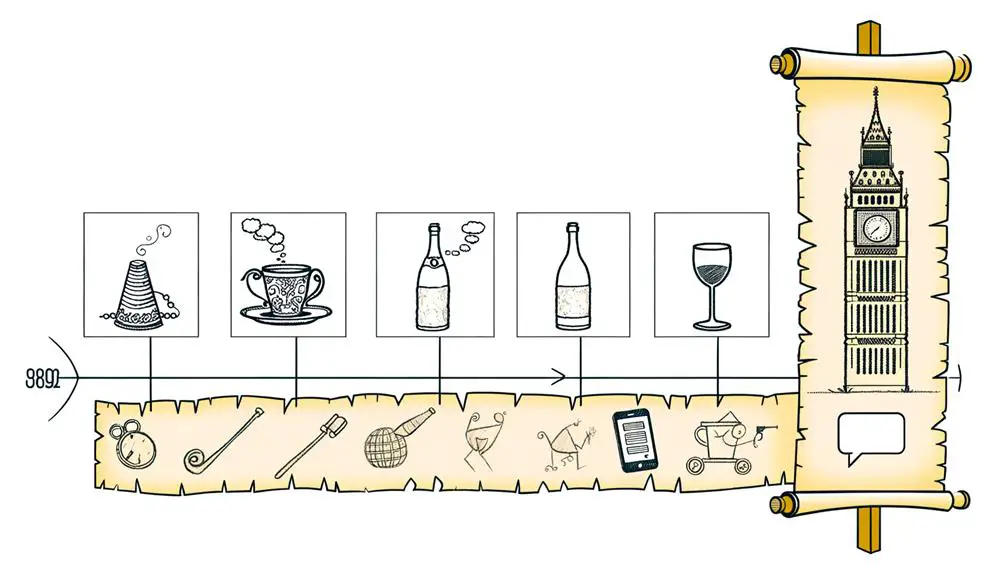
As we explore the evolution of language, it's essential to acknowledge how slang like 'claret' demonstrates the dynamic nature of communication, continuously adjusting to reflect societal changes and cultural nuances. This fluidity isn't confined to English alone; every language undergoes a similar process of adaptation, where words and phrases evolve to match the current zeitgeist. Understanding slang evolution is akin to peering through a linguistic kaleidoscope, revealing much about our collective history, values, and attitudes.
Language adaptation isn't merely a proof of creativity; it's a survival mechanism. As societies evolve, so too must the languages they use, ensuring that communication remains effective and relevant. Slang, in particular, serves as the vanguard of linguistic change, often emerging from subcultures before making its way into the mainstream lexicon. This shift from the margins to widespread acceptance encapsulates the essence of how language evolves.
The case of 'claret' in British slang highlights the importance of context in language adaptation. Originally denoting a type of wine, its slang usage reflects a broader cultural and linguistic shift. Such examples underscore the complexity of language evolution, illustrating how words can acquire new meanings and reflect changing societal dynamics.

